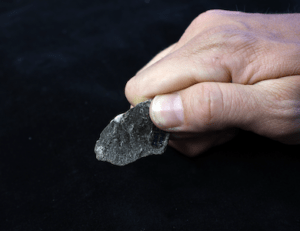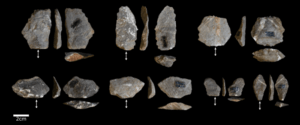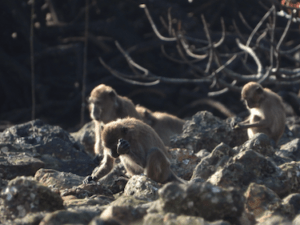
AMERICAN ASSOCIATION FOR THE ADVANCEMENT OF SCIENCE (AAAS)—Stone flakes made unintentionally by modern long-tailed wild macaques in Thailand (Macaca fascicularis) while cracking nuts strongly resemble those described as being made intentionally by early hominins more than one million years ago, according to a new analysis. Tomos Proffitt and colleagues’ findings* challenge archaeologists’ current characterization of the emergence of intentional tool production in our earliest human ancestors. Efforts to find evidence for the evolutionary uniqueness of humans from other primates often involve explorations of how and when our ancestors began intentionally producing tools. Ongoing studies into the origins of intentional tool production rely on a set of criteria to infer how the tools could have been made – such as the presence of similar repeated fracture patterns. However, modern primates have also been observed to use stone tools for nut cracking, digging, and other activities. The resemblance of some tools used by primates to early hominin tools has led many to speculate that similar behavior could have been a precursor to intentional tool production by hominins. To explore further, Proffitt et al. collected and analyzed 1,119 artifacts from 40 macaque nut-cracking locations on Ya Noi Island in Lobi Bay, Thailand, that resembled different stone flakes, fragments, hammerstones, and anvils. They compared these with Oldowan and Lomekwian artifacts previously recovered from sites in Tanzania, Kenya, and Ethiopia which had been associated with intentional tool use by our ancestors as long as 3.3 million years ago. The researchers found that fracture patterns from modern macaque flakes fell within the same range as many of the prehistoric flakes, and that the former could replace up to 70% of Oldowan flakes before statistical differences could be observed. “The results of this study demonstrate that a fundamental reassessment of how we define and identify this uniquely hominin behavior in the archaeological record is still needed,” the researchers conclude.
____________________________

A sharp-edged flake accidentally produced by a long-tailed macaque during nut cracking. Proffitt et al, 2023; Technological Primates Research Group, Max Planck Institute for Evolutionary Anthropology
____________________________

Examples of sharp edged flakes produced unintentionally by long-tailed macaques. Proffitt et al, 2023; Technological Primates Research Group, Max Planck Institute for Evolutionary Anthropology
____________________________

Example of a long-tailed macaque using a stone tool to access food. Lydia V. Luncz
____________________________
Article Source: AMERICAN ASSOCIATION FOR THE ADVANCEMENT OF SCIENCE (AAAS) news release
*Wild macaques challenge the origin of intentional tool production, Science Advances, 10-Mar-2023. 10.1126/sciadv.ade8159
____________________________
Advertisement

Don’t miss out on this unforgettable evening as Dr. Hawass reveals the most closely guarded secrets of ancient Egypt and presents his groundbreaking new discoveries and latest research live on stage. As the man behind all major discoveries in Egypt over the last few decades and director of several ongoing archaeological projects, Dr. Hawass may yet surprise you with unexpected revelations that will make news across the world.
____________________________




